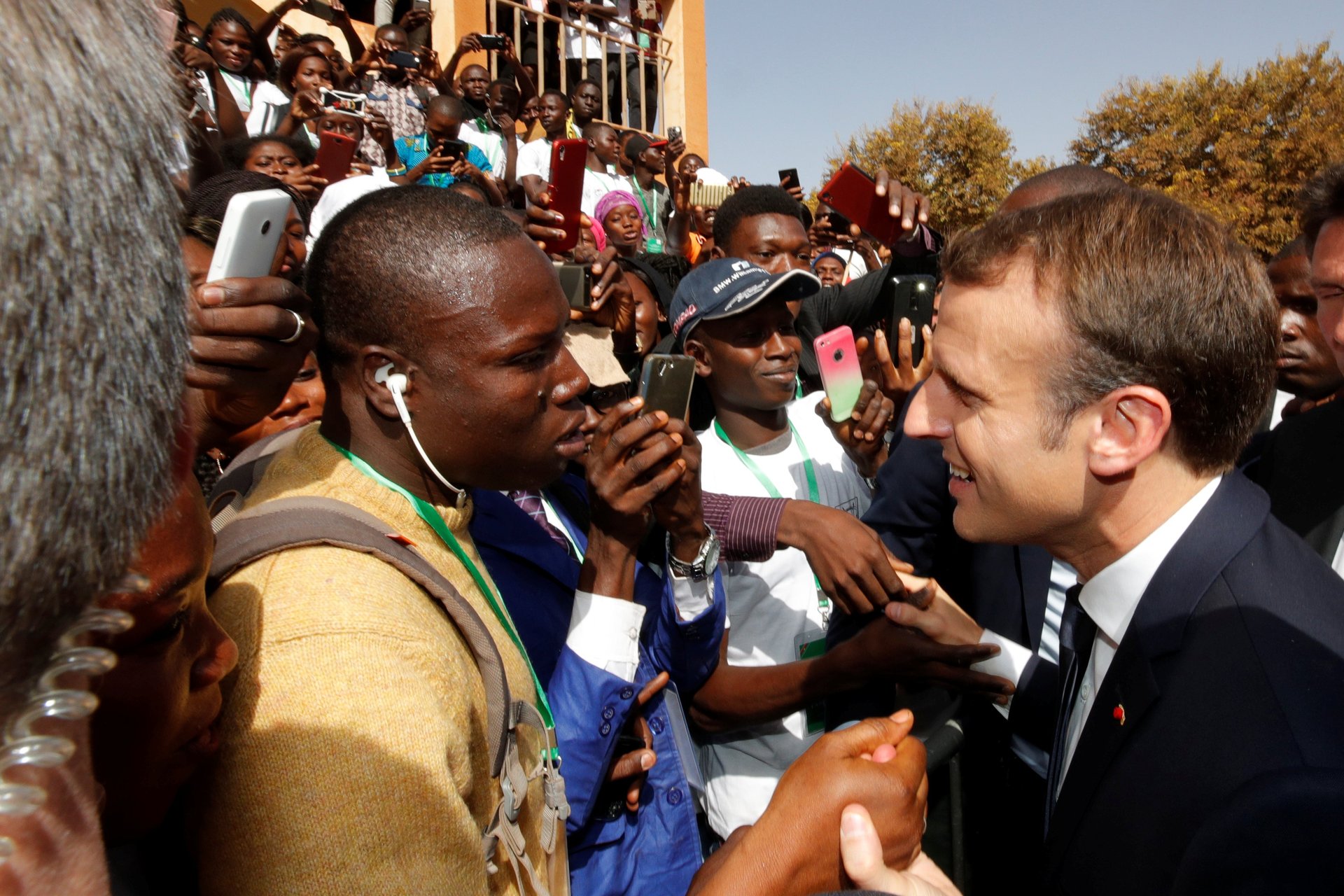What France’s Macron really means when he says Africa needs to look after itself
The Big Africa Speech is a ritual for every French president. For better or worse, it serves as the tone-setter for his Africa policy, and signals his approach to the tangle of political and business networks known as Françafrique.


The Big Africa Speech is a ritual for every French president. For better or worse, it serves as the tone-setter for his Africa policy, and signals his approach to the tangle of political and business networks known as Françafrique.
Nicolas Sarkozy’s speech, given in Dakar in 2007, is remembered for an arrogant, paternalistic phrase: “The African has not yet sufficiently entered History.” It did not go over well. François Hollande’s speech in 2012, also in Dakar, was amiable but insipid. Like Hollande himself, it is largely forgotten.
Emmanuel Macron has now given his own Big Africa Speech. It came Tuesday (Nov. 28), in a raucous auditorium at the University of Ouagadougou, in Burkina Faso. What will likely be remembered most vividly is the atmospherics. Where past presidents went formal and flowery, Macron went casual and scrappy. He fed off the room full of students and their energy. He took questions—a big break from his predecessors—and even solicited direct questions from the crowd after the pre-selected questioners had their turn.
The question phase produced a small blunder that has turned into a viral clip. After serious questions to do with security and economics, a student asked about local power supply, including to the campus, where the air conditioning had gone out. Macron said that was not for him to solve, but for Burkina’s president, Roch Marc-Christian Kaboré, who was standing offstage. An awkward moment ensued as Kaboré briefly left the room (his team later hinted it was a bathroom break) and Macron joked he was going to fix the AC. The social-media take was that Macron “humiliated” Kaboré, though it could also be seen as pantomime with the Burkinabè leader playing along.
Macron fancies himself a disrupter; his Africa tone is no exception. Like past presidents, he announced a new course for France-Africa relations, but he couched it in generational terms, distancing himself—he was born in 1977—from the colonial hangover and urging young Burkinabè to do the same. He was more frank than his predecessors about, as he put it, “the crimes of colonialism.” He hailed Burkina’s late anti-imperialist hero Thomas Sankara, to great applause. He walked back an unfortunate earlier comment of his own about demographic growth as a “civilizational” challenge. His references to African writers and his tactical insertions of Burkinabè phrases were judicious and well-timed.
But Macron’s disruption of French politics comes from the center—a very Establishment kind of disruption—and his Africa policy promises the same. The new approach looks a lot like the old. He is doubling down on France’s security apparatus in the region, he called for applause for French soldiers serving in the Sahel, he celebrated the role of French firms in infrastructure projects, and his economic advice to young Africans was vapid, consisting mostly of buzzwords: entrepreneurship, innovation, and mobility.
Two points in Macron’s speech, however, are truly new and have potential for major consequences. One is political. Macron promised that France’s remaining secret files to do with Thomas Sankara’s assassination, in 1987—which may not have been ordered by France or its close ally Côte d’Ivoire, but was certainly convenient for them—will be declassified and made available to the Burkinabè courts. This sets a major precedent, and could make more than a few Françafrique actors nervous well beyond Burkina Faso. It is also high time, and goes much further than rhetoric toward dealing with the past.
The second is Macron’s reply to a student challenging him on the CFA franc, the currency of 14 African countries. The CFA and its structure, in which the countries, through two regional central banks, deposit 50% of foreign exchange reserves at the Bank of France in exchange for fixed-rate euro convertibility, are facing their most significant criticism in decades.
Macron defended the CFA, but only to the extent of pointing out that separate currencies would still need their own forex backing. (He sidestepped the key point that countries would then be able to determine their own monetary policy and use it to shape development.) But he also said he’d be open to any change the member countries wanted—including expanding the CFA or a successor currency to the rest of the region, Nigeria included; changing the exchange rate-setting mechanism; or ending the whole arrangement altogether.
This, perhaps, was Macron’s most revolutionary talk of all. The CFA is not the “colonial tax” that periodic social-media screeds label it, but it certainly is a fundamental structure of the French-African apparatus. And Macron is right that any decision to change it must come from African leaders themselves. He knows, of course, that this will be hard for them, as political elites in Franc zone countries have used the system for decades to their benefit. Disrupting those interests, he signaled, would be fine with him.